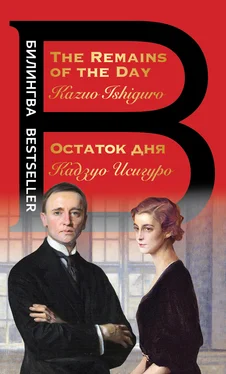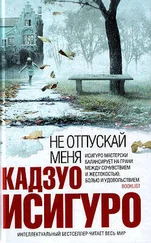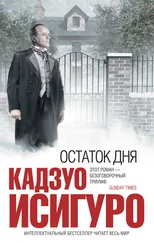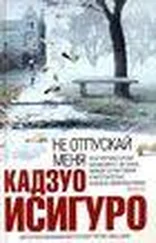During this time, I also spent many minutes examining the road atlas, and perusing also the relevant volumes of Mrs Jane Symons’s The Wonder of England. If you are not familiar with Mrs Symons’s books – a series running to seven volumes, each one concentrating on one region of the British Isles – I heartily recommend them. They were written during the thirties, but much of it would still be up to date – after all, I do not imagine German bombs have altered our countryside so significantly. Mrs Symons was, as a matter of fact, a frequent visitor to this house before the war; indeed, she was among the most popular as far as the staff were concerned due to the kind appreciation she never shied from showing. It was in those days, then, prompted by my natural admiration for the lady, that I had first taken to perusing her volumes in the library whenever I had an odd moment. Indeed, I recall that shortly after Miss Kenton’s departure to Cornwall in 1936, myself never having been to that part of the country, I would often glance through Volume III of Mrs Symons’s work, the volume which describes to readers the delights of Devon and Cornwall, complete with photographs and – to my mind even more evocative – a variety of artists’ sketches of that region. It was thus that I had been able to gain some sense of the sort of place Miss Kenton had gone to live her married life. But this was, as I say, back in the thirties, when as I understand, Mrs Symons’s books were being admired in houses up and down the country. I had not looked through those volumes for many years, until these recent developments led me to get down from the shelf the Devon and Cornwall volume once more. I studied all over again those marvellous descriptions and illustrations, and you can perhaps understand my growing excitement at the notion that I might now actually undertake a motoring trip myself around that same part of the country.
It seemed in the end there was little else to do but actually to raise the matter again with Mr Farraday. There was always the possibility, of course, that his suggestion of a fortnight ago may have been a whim of the moment, and he would no longer be approving of the idea. But from my observation of Mr Farraday over these months, he is not one of those gentlemen prone to that most irritating of traits in an employer – inconsistency. There was no reason to believe he would not be as enthusiastic as before about my proposed motoring trip – indeed, that he would not repeat his most kind offer to ‘foot the bill for the gas’. Nevertheless, I considered most carefully what might be the most opportune occasion to bring the matter up with him; for although I would not for one moment, as I say, suspect Mr Farraday of inconsistency, it nevertheless made sense not to broach the topic when he was preoccupied or distracted. A refusal in such circumstances may well not reflect my employer’s true feelings on the matter, but once having sustained such a dismissal, I could not easily bring it up again. It was clear, then, that I had to choose my moment wisely.
In the end, I decided the most prudent moment in the day would be as I served afternoon tea in the drawing room. Mr Farraday will usually have just returned from his short walk on the downs at that point, so he is rarely engrossed in his reading or writing as he tends to be in the evenings. In fact, when I bring in the afternoon tea, Mr Farraday is inclined to close any book or periodical he has been reading, rise and stretch out his arms in front of the windows, as though in anticipation of conversation with me.
As it was, I believe my judgement proved quite sound on the question of timing; the fact that things turned out as they did is entirely attributable to an error of judgement in another direction altogether. That is to say, I did not take sufficient account of the fact that at that time of the day, what Mr Farraday enjoys is a conversation of a light-hearted, humorous sort. Knowing this to be his likely mood when I brought in the tea yesterday afternoon, and being aware of his general propensity to talk with me in a bantering tone at such moments, it it would certainly have been wiser not to have mentioned Miss Kenton at all. But you will perhaps understand that there was a natural tendency on my part, in asking what was after all a generous favour from my employer, to hint that there was a good professional motive behind my request. So it was that in indicating my reasons for preferring the West Country for my motoring, instead of leaving it at mentioning several of the alluring details as conveyed by Mrs Symons’s volume, I made the error of declaring that a former housekeeper of Darlington Hall was resident in that region. I suppose I must have been intending to explain to Mr Farraday how I would thus be able to explore an option which might prove the ideal solution to our present small problems here in this house. It was only after I had mentioned Miss Kenton that I suddenly realized how entirely inappropriate it would be for me to continue. Not only was I unable to be certain of Miss Kenton’s desire to rejoin the staff here, I had not, of course, even discussed the question of additional staff with Mr Farraday since that first preliminary meeting over a year ago. To have continued pronouncing aloud my thoughts on the future of Darlington Hall would have been, to say the very least, presumptuous. I suspect, then, that I paused rather abruptly and looked a little awkward. In any case, Mr Farraday seized the opportunity to grin broadly at me and say with some deliberation:
‘My, my, Stevens. A lady-friend. And at your age.’
This was a most embarrassing situation, one in which Lord Darlington would never have placed an employee. But then I do not mean to imply anything derogatory about Mr Farraday; he is, after all, an American gentleman and his ways are often very different. There is no question at all that he meant any harm; but you will no doubt appreciate how uncomfortable a situation this was for me.
‘I’d never have figured you for such a lady’s man, Stevens,’ he went on. ‘Keeps the spirit young, I guess. But then I really don’t know it’s right for me to be helping you with such dubious assignations.’
Naturally, I felt the temptation to deny immediately and unambiguously such motivations as my employer was imputing to me, but saw in time that to do so would be to rise to Mr Farraday’s bait, and the situation would only become increasingly embarrassing. I therefore continued to stand there awkwardly, waiting for my employer to give me permission to undertake the motoring trip.
Embarrassing as those moments were for me, I would not wish to imply that I in any way blame Mr Farraday, who is in no sense an unkind person; he was, I am sure, merely enjoying the sort of bantering which in the United States, no doubt, is a sign of a good, friendly understanding between employer and employee, indulged in as a kind of affectionate sport. Indeed, to put things into a proper perspective, I should point out that just such bantering on my new employer’s part has characterized much of our relationship over these months – though I must confess, I remain rather unsure as to how I should respond. In fact, during my first days under Mr Farraday, I was once or twice quite astounded by some of the things he would say to me. For instance, I once had occasion to ask him if a certain gentleman expected at the house was likely to be accompanied by his wife.
God help us if she does come,’ Mr Farraday replied. ‘Maybe you could keep her off our hands, Stevens. Maybe you could take her out to one of those stables around Mr Morgan’s farm. Keep her entertained in all that hay. She may be just your type.’
For a moment or two, I had not an idea what my employer was saying. Then I realized he was making some sort of joke and endeavoured to smile appropriately, though I suspect some residue of my bewilderment, not to say shock, remained detectable in my expression.
Читать дальше












